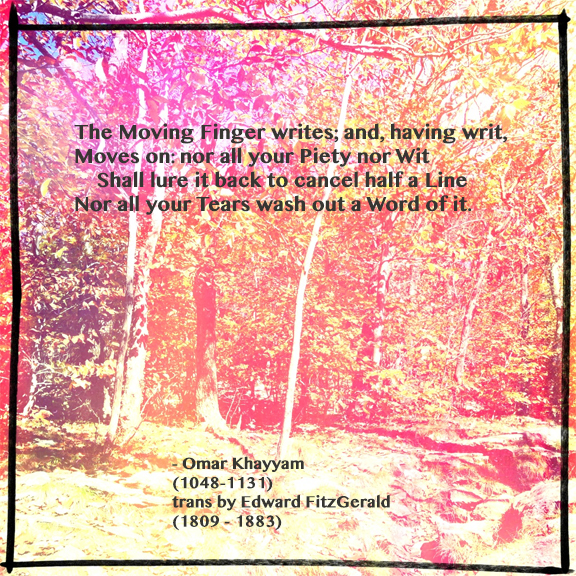 | ||
Tasrifan ruba i masa kini
Rubāʿī (Persian: رباعی rubāʿī) is a poem, or verse of a poem, consisting of four lines. It refers specifically to a Persian quatrain, or its derivative form in English and other languages. The plural form of the word, رباعيات rubāʿiyāt, often anglicised as rubaiyat, is used for a collection of such quatrains. There are a number of possible rhyme schemes to the rubaiyat form, e.g. AABA, AAAA. In Persian verse, the ruba'i is usually written as a four-line (or two-couplet) poem, with rhymes at the middle and end of each line.
Contents
An author described;
" basically Ruba'i belongs to Persia and its metres had been created by a non-Arab poet Abul Hassan Rodeki and that was also brought into practice by non-Arab and Urdu poets. Ruba'i (quatrain) has special metres containing 24 categories (one can say "divisions" or "branches" too). Ruba'i can only be composed in those special metres, not any other normal meter. Ruba'i consists of only four lines, its two lines called 'Sehr' (Stanza). Ruba'i's first and second line must end in rhyme (example-as behold and cold.), third without rhyme, but within 24 special metres, that cannot be changed and fourth line again in the selected rhyme, but that fourth line (misra) contains high, strong and complete and deep meanings, that must be related with above three lines. These should be addressed only one point or subject, not as like ghazals or other forms of the poetry have."
This is an example of a ruba'i from Rūmī's Dīwān-i Shams.
Anwār-i Ṣalāḥu'd-Dīn bar angēkhta bād Dar dīda u jān-i ʿāshiqān rēkhta bād Har jān ki laṭīf gasht u az luṭf guzasht Bā khāk-i Ṣalāḥu'd-Dīn dar āmēkhta bādRuba'i in English
The verse form AABA as used in English verse is known as the Rubaiyat Quatrain due to its use by Edward FitzGerald in his famous 1859 translation, The Rubaiyat of Omar Khayyam. Algernon Charles Swinburne, one of the first admirers of FitzGerald's translation of Khayyam's medieval Persian verses, was the first to imitate the stanza form, which subsequently became popular and was used widely, as in the case of Robert Frost's 1922 poem "Stopping by Woods on a Snowy Evening".
Fitzgerald's translation became so popular by the turn of the century that hundreds of American humorists wrote parodies using the form and, to varying degrees, the content of his stanzas, including The Rubaiyat of Ohow Dryyam, The Rubaiyat of A Persian Kitten, The Rubaiyat of Omar Cayenne and The Rubaiyat of Omar Khayyam, Jr.
sample: Goblet a Ruba'i of Omar Khayyám translated by Edward FitzGerald:
At dawn came a calling from the tavern Hark drunken mad man of the cavern Before destiny fills our cup, our urn.In extended sequences of ruba'i stanzas, the convention is sometimes extended so that the unrhymed line of the current stanza becomes the rhyme for the following stanza. The structure can be made cyclical by linking the unrhymed line of the final stanza back to the first stanza: ZZAZ. These more stringent systems were not, however, used by FitzGerald in his Rubaiyat.
